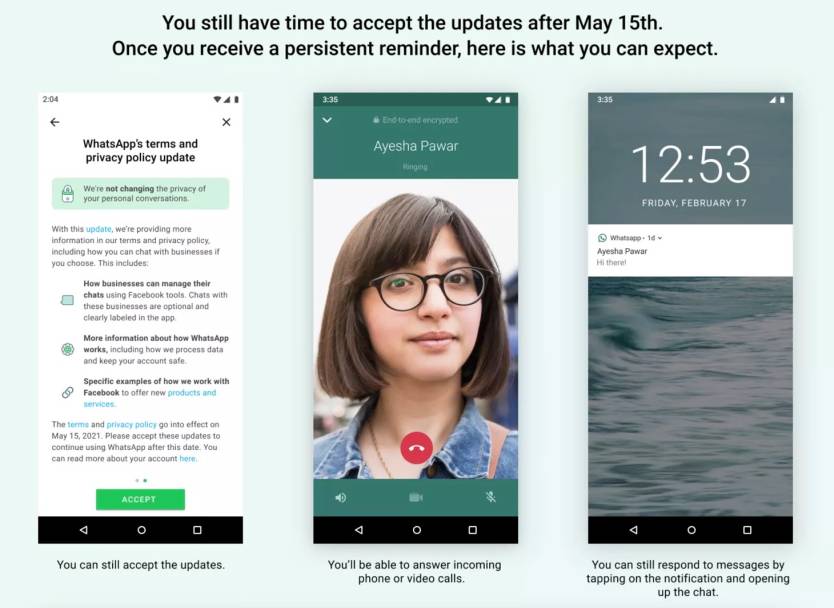What Happens If You Don't Accept Facebook's New WhatsApp Privacy Policy?
Facebook planned a massive WhatsApp privacy policy change for February 8th that would allow it to collect e-commerce data from WhatsApp users in specific markets. Users started seeing notifications early in 2021 about the imminent change, which made it clear that there was no way to opt-out. The backlash that followed forced Facebook to delay the change to May 15th, with the company giving itself more than three extra months to clarify what the changes mean. Facebook insisted in its explanations that the new privacy policy will not alter the robust end-to-end encryption that protects chats and calls but only impact data related to optional e-commerce activities done through its platforms. But Facebook never really explained why it needs to collect user data and acknowledged that the privacy policy would not impact WhatsApp users in the UK and Europe. The company then gave people time until May 15th to accept the new terms or risk losing access to some WhatsApp functionality.
It all changed late last week when Facebook confirmed it would not delete WhatsApp accounts if the terms aren't accepted by May 15th. It seemed like a loss for the company at the time, with Facebook seemingly ready to allow people who don't accept the new terms to use WhatsApp. But it turns out that Facebook is still planning to WhatsApp functionality even if you don't accept the new terms.
We noted on Friday that the WhatsApp FAQ page that Facebook put up in mid-February seemed to contain the same language as before, indicating that WhatsApp functionality will be limited if the privacy policy isn't accepted. Even back in February, Facebook said it would not delete WhatsApp accounts that do not accept the terms by May 15th and that users can accept them after that deadline to reenable full app functionality. Otherwise, they would be able to receive calls and notifications for a while before Facebook disabled the ability to read or send messages. Eventually, the inactivity period might lead to the account being terminated according to WhatsApp's preexisting rules.
Facebook has changed the FAQ page to confirm that it still plans to ruin the WhatsApp experience for all users who do not accept the privacy policy update (here's a version of the FAQ page from mid-February). Facebook makes it clear from the start that it doesn't intend to delete accounts and that it'll keep pushing people to accept it via what it calls "persistent reminders:"
No one will have their accounts deleted or lose functionality of WhatsApp on May 15th because of this update.
For the last several weeks we've displayed a notification in WhatsApp providing more information about the update. After giving everyone time to review, we're continuing to remind those who haven't had the chance to do so to review and accept. After a period of several weeks, the reminder people receive will eventually become persistent.
If that's still not enough to convince you to accept, your WhatsApp functionality will be limited — here's what it'll feel like:
You won't be able to access your chat list, but you can still answer incoming phone and video calls. If you have notifications enabled, you can tap on them to read or respond to a message or call back a missed phone or video call.
After a few weeks of limited functionality, you won't be able to receive incoming calls or notifications and WhatsApp will stop sending messages and calls to your phone.
The following image also briefly recaps the consequences of not accepting the privacy changes:

Infographic explains what happens if WhatsApp users do not accept the new privacy policy.
Facebook also reminds users that they can still export chat histories if they want, and that WhatsApp inactivity could still lead to account deletion. If users are inactive for 120 days, the account is deleted regardless of whether or not they accepted the privacy changes. Facebook only makes it clear that failure to accept the terms of service changes by or after May 15th will not result in immediate account deletion.
Millions of people have already moved to Signal and Telegram earlier this year, with these WhatsApp rivals seeing increasing interest thanks to controversial privacy policy changes. But even so, it's likely that many people will keep WhatsApp installed and accept the new privacy policy to ensure they can still stay in touch with friends and family members who don't want to move to a different chat platform.
